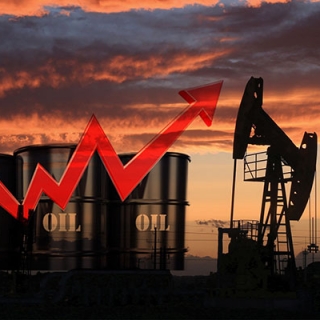


Oil prices plunged 2% to a 4-year low on Monday on concerns that U.S. President Donald Trump's latest trade tariffs could push economies around the world into recession and dent global demand for energy.
Brent crude futures fell $1.37, or 2.1%, to settle at $64.21 a barrel, while U.S. West Texas Intermediate crude futures fell $1.29, or 2.1%, to settle at $60.70.
That pushed both crude benchmarks, which fell about 11% last week, to their lowest closes since April 2021.
The trading session was marked by extreme volatility, with prices dropping more than $3 a barrel intraday overnight and rising more than $1 early Monday after a news report said Trump was considering a 90-day tariff pause. White House officials quickly denied the report, sending crude prices back into the red.
Confirming investor fears that a global trade war has begun, China, the world's second-largest economy after the U.S., said on Friday it would impose an additional 34% tariff on American goods in retaliation for Trump's latest tariffs.
Trump responded that the U.S. would impose an additional 50% tariff on China if Beijing did not withdraw its retaliatory tariffs on the U.S., and said "all talks with China about the meeting that they requested with us will be stopped."
Meanwhile, the European Commission proposed retaliatory tariffs of 25% on a range of U.S. goods on Monday in response to President Donald Trump's tariffs on steel and aluminum, a document seen by Reuters showed.
Goldman Sachs forecast a 45% chance of a recession in the U.S. over the next 12 months, and revised its oil price forecasts downward. Citi and Morgan Stanley also cut their Brent outlooks. JPMorgan said it saw a 60% chance of a recession in the U.S. and globally.
In addition to growing recession fears, there are growing concerns that the Trump administration's policies will drive up prices.
US Federal Reserve Governor Adriana Kugler said some of the recent rise in goods and services inflation may be "anticipation" of the impact of Trump administration policies, adding that it is a priority for the Fed to control inflation.
The Fed and other central banks use higher interest rates to combat inflation. But higher rates raise consumer borrowing costs and can hurt economic growth and oil demand.
SUPPLIER REACTION
Saudi Arabia on Sunday announced a sharp cut in crude prices for Asian buyers, sending May prices to a four-month low.
"This shows the belief that tariffs will hurt oil demand," said PVM analyst Tamas Varga. "This shows that the Saudis, like everyone and their dog, expect the supply-demand balance to be affected and they are forced to cut their official selling prices."
Adding to the downward momentum, the OPEC+ group of the Organization of the Petroleum Exporting Countries and its allies decided to advance plans to increase output. The group now aims to return 411,000 barrels per day to the market in May, up from the previously planned 135,000 barrels per day.
Over the weekend, OPEC+ ministers stressed the need for full compliance with oil output targets and called on overproducing producers to submit plans by April 15 to compensate for pumping too much.(Newsmaker23)
Source: Investing.com
Oil prices stabilized on Thursday (February 12th), as the market reassigned a risk premium to US-Iran tensions despite US inventory data showing swelling domestic supplies. This movement confirms one ...
Oil prices rose on Wednesday (February 11th), supported by a combination of geopolitical risk premiums from US-Iran tensions and more solid Asian demand signals particularly from India which helped ea...
Oil remained in the green zone on Tuesday (February 10th), as the market refused to abandon the Middle East risk premium. As of 13:07 GMT (20:07 WIB), Brent rose +0.4% to $69.32/barrel, while WTI rose...
Oil prices fell about 1% on Monday as concerns about conflict in the Middle East eased slightly. The market calmed after the US and Iran agreed to resume talks on Tehran's nuclear program, reducing fe...
Oil prices moved slightly higher in a volatile session on Friday, as investors assessed the direction of nuclear negotiations between the United States and Iran. Price movements appeared sensitive to ...
Oil prices stabilized on Thursday (February 12th), as the market reassigned a risk premium to US-Iran tensions despite US inventory data showing swelling domestic supplies. This movement confirms one thing: geopolitical headlines are still more...
Gold prices weakened slightly on Thursday (February 12th), as more solid US employment data reduced market confidence in an imminent Federal Reserve interest rate cut. The strong employment data prompted market participants to shift expectations of...
The Hang Seng Index reversed its downward trend in Hong Kong on Thursday (February 12th), weakening by around 0.9% to around 27,000 after a strong session earlier. This decline halted the momentum of the short term rally, as investors began to...